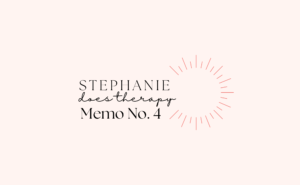Starting Over in a New Place
Moving to a new place was something I’d dreamed about for a long time. I wanted to know what it felt like to live somewhere other than my home state. I wanted to experience a new rhythm of life, new landscapes, new routines.
A few weeks ago, I finally did it. I moved to Washington. It’s beautiful here. I’ve been having so much fun exploring and learning more about my little town. But as the newness settles in, I’m realizing what I need most: friends.
The Challenge of Adult Friendship
Making new friends as an adult is no small task. I feel up for the challenge. While I also know it won’t be easy. Not because I doubt my ability to be a good friend, but because meeting new people takes time, energy, and… small talk.
And like you, I hate small talk.
It feels superficial, repetitive, and rarely scratches the surface of anything meaningful. My brain likes to dive deep… (perhaps that’s why I became a therapist?). Still, small talk serves a purpose. It’s the bridge between strangers and connection.
Small talk, practiced over time, builds the trust needed to eventually have those deep, authentic conversations.
Small talk × time + consistency = friendship.
Look at me doing math. (We all know therapists don’t do math.)
OCD, Overthinking, and Connection
One of the ways OCD has impacted my life is by making me doubt my relationships. It’s led me to pull away—to quiet the noise of overthinking—which ironically pushes people away. I’ve spent hours stuck in rumination and replay, so distressed it left me physically exhausted.
Gratefully, I don’t live like that anymore. I understand OCD now. Through therapy, I’ve gained tools and skills to manage it—tools that help me notice when I’m spiraling, pause before reacting, and move through relationships with more self-trust and ease.
Healing the “Not Enough” Wound
I also have to give an honorable mention to trauma. Therapy helped me heal the part of me that believed I didn’t belong, that I wasn’t good enough, that I needed to earn my place in people’s lives.
Now, I can say I fully accept myself! Yes, even the weird parts. That self-acceptance has made space for more genuine connection than I ever thought possible.
A New Chapter
So here I am, starting fresh in a new state, practicing small talk and reminding myself that connection takes time. I may not know many people yet, but I do know this: I have the tools, the self-awareness, and the willingness to keep showing up.
Because even small talk can lead to something big.

